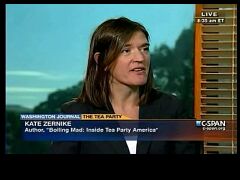'Obscure Texts By Long-Dead Writers'...Like Nobel-Prize Winning Economist Friedrich Hayek?
Don't venture into libertarian intellectual territory unless you know what you're talking about. That's the take-home lesson in the aftermath of Kate Zernike's history-challenged Saturday story on texts that influence the philosophy of the Tea Party movement, "Movement of the Moment Looks to Long-Ago Texts."
The Tea Party is a thoroughly modern movement, organizing on Twitter and Facebook to become the most dynamic force of the midterm elections.
But when it comes to ideology, it has reached back to dusty bookshelves for long-dormant ideas.
It has resurrected once-obscure texts by dead writers - in some cases elevating them to best-seller status - to form a kind of Tea Party canon. Recommended by Tea Party icons like Ron Paul and Glenn Beck, the texts are being quoted everywhere from protest signs to Republican Party platforms.Pamphlets in the Tea Party bid for a Second American Revolution, the works include Frédéric Bastiat's "The Law," published in 1850, which proclaimed that taxing people to pay for schools or roads was government-sanctioned theft, and Friedrich Hayek's "Road to Serfdom" (1944), which argued that a government that intervened in the economy would inevitably intervene in every aspect of its citizens' lives.
....
As the Tea Party has exerted increasing force over American politics, the influence of the books has shown up in many ways.
Representative Paul D. Ryan, Republican of Wisconsin, alluded to "The Road to Serfdom" in introducing his economic "Roadmap for America's Future," which many other Republicans have embraced. Ron Johnson, who entered politics through a Tea Party meeting and is now the Republican nominee for Senate in Wisconsin, asserted that the $20 billion escrow fund that the Obama administration forced BP to set up to pay damages from the Gulf of Mexico oil spill circumvented "the rule of law," Hayek's term for the unwritten code that prohibits the government from interfering with the pursuit of "personal ends and desires."
More about Zernike's novel definition of "the rule of law" later.
Contradicting herself, Zernike related that Hayek, far from obscure, won the Nobel Prize in 1974, hardly ancient history. (Hayek died in 1992 at the age of 92.)
Neither Hayek nor Bastiat were writing with the United States in mind. But their arguments, too, have become fodder for a movement that believes that government intervention is the wrong solution to the country's economic woes - and is, in fact, the problem, resulting in runaway national debt.
Hayek, who won the Nobel Prize in economic sciences in 1974, argued that when a government begins any kind of central economic planning, it must decide which needs are more and less important, and therefore ends up controlling every aspect of its citizens lives.
Jonah Goldberg at National Review was merciless in his mockery of Zernike's evident ignorance of the basic concept of "the rule of law":
Everything about this is hilarious. The rule of law is an "unwritten code"? Really? I thought the rule of law was the code. The rule of law is not "Hayek's term" (it's A.V. Dicey's). But the idea stretches back to the earliest days of Western civilization. So on the one hand Hayek is obscure, but on the other hand he's eclipsed Aristotle, Locke, Montesquieu, and the gang. Way to go Hayek!
If I had said a day ago that your typical New York Times reporter doesn't have the vaguest sense of what the rule of law means, I would have heard from all sorts of earnest liberal readers - and probably some conservative ones too - about how I was setting up a straw man. But now we know it's true. It's not just that she doesn't know what it is, it's that even after (presumably) looking it up, she still couldn't describe it and none of her editors raised an eyebrow when she buttered it.
Media critic Ira Stoll called the piece "a comically bad news article," pointing out "it's just inaccurate to call Hayek obscure, dusty, or dormant, linking to "a photo of President Reagan greeting Hayek at the White House," "an article about Hayek that appeared in the New Yorker in 2000," and "a 2004 article in the New York Times-owned Boston Globe that quotes Lawrence Summers as saying Hayek's legacy is 'the single most important thing to learn from an economics course today.'"



